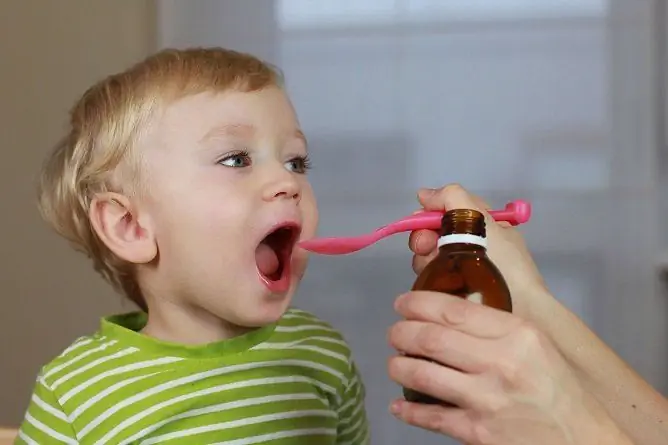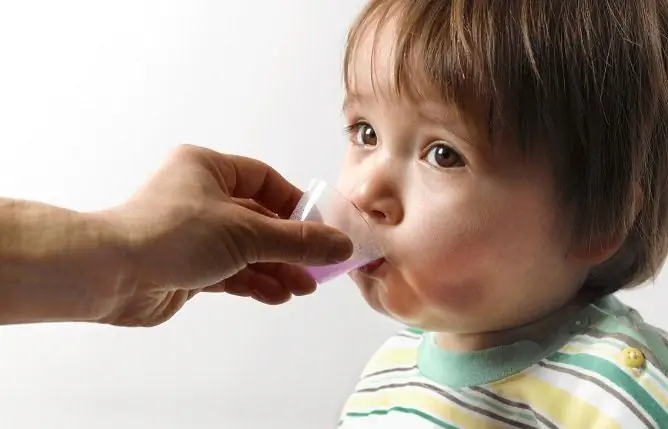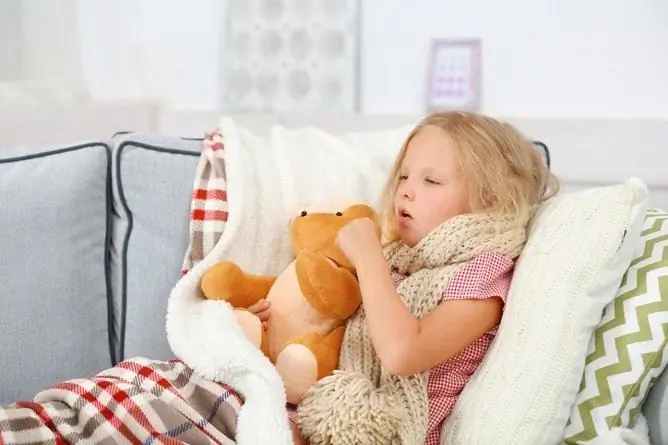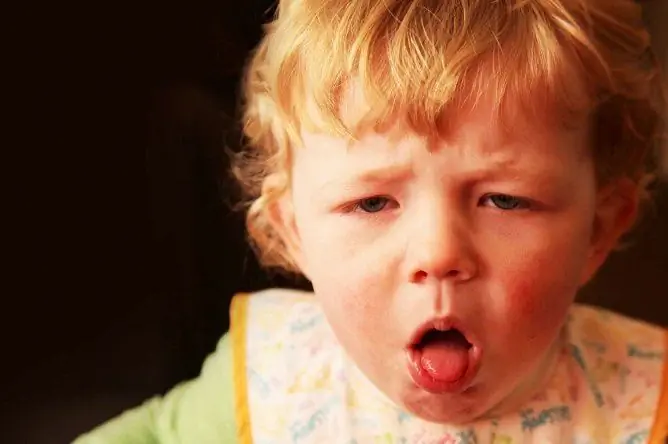- Author Rachel Wainwright wainwright@abchealthonline.com.
- Public 2024-01-15 19:51.
- Last modified 2025-11-02 20:14.
Prolonged cough in a child: how to treat, how it manifests itself, why it occurs
The content of the article:
- How to treat a lingering cough in children
- Folk remedies for prolonged cough
- Causes and risk factors for the development of a lingering cough
- Signs of a lingering cough and accompanying symptoms
- Video
A lingering cough in a child is said if this symptom is observed for more than three weeks in a row. In children, this cough is usually more severe than in adult patients, since the mucous membranes of the respiratory tract are more sensitive and more irritated when they cough.
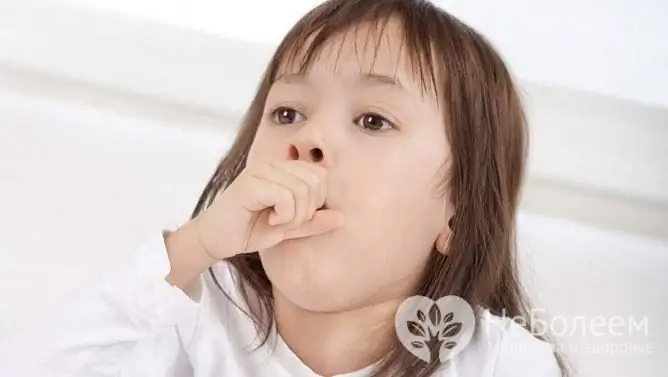
A lingering cough in children can be a sign of a serious illness, such as bronchial asthma.
Normally, a person can experience up to 10-12 cough shocks per day. A prolonged cough after some diseases of the respiratory system (for example, bronchitis), the intensity of which gradually decreases, refers to residual effects and does not interfere with the healing process.
Self-medication of a cough in children, especially a protracted one, cannot be dealt with; you must definitely consult a doctor and follow all his recommendations.
How to treat a lingering cough in children
Treatment of a lingering cough in children, both dry and wet, is prescribed by a doctor depending on the cause of the disease and taking into account many factors (age, weight, etc.).
When coughing with sputum that is difficult to separate, the patient is prescribed mucolytic drugs that help thin the mucus, expectorants that facilitate the excretion of sputum from the respiratory tract.
Sometimes, with a dry cough in the absence of accumulations of mucus, antitussive drugs can be shown, but the need for them rarely arises - only when the attacks of unproductive cough acquire a painful, debilitating character.

Inhalation for children is carried out using a nebulizer
In the presence of an infectious process, depending on the type of pathogen, the patient may be prescribed antibiotics, antimycotic, antiviral drugs. With an allergic cough, you need to minimize the patient's contact with the allergen. You may also need to use antihistamines.
Often, with a lingering cough, drugs are prescribed that have a complex effect (mucolytic, expectorant, anti-inflammatory, antimicrobial).
Mostly in children's practice, antitussive drugs are used in the form of a syrup. They are convenient and safe for the smallest patients (as opposed to pills that the baby can inhale) and easy to dose.
A good therapeutic effect is provided by inhalations, which are administered to children using a nebulizer (strictly in the presence of parents or other adults). This allows the drug to be delivered directly to the area of inflammation. For inhalation, saline, alkaline mineral water, and solutions of drugs (for example, expectorants based on ambroxol) are used.
In order to accelerate convalescence, physiotherapy procedures, breathing exercises, massage can be prescribed.
Folk remedies for prolonged cough
Often parents ask the question, how to treat a lingering cough in a child from folk remedies? It is believed that such treatment can be more effective than taking pharmaceuticals, and besides, it is safe. This opinion is deeply mistaken. The effectiveness of folk remedies is lower than that of pharmaceuticals, therefore, they can be used only as additional therapy - either in combination with drug treatment, or independently at the stage of recovery, as supportive therapy.

Black radish juice with honey is a popular cough remedy for children
The safety profile of most folk remedies has not been studied, however, medicinal herbs are much more likely than pharmaceuticals to cause allergic reactions, and it is difficult to observe the dosage of the active substance when they are taken. For these reasons, treatment with traditional medicine in children should be carried out strictly under medical supervision, only in cases where it is justified.
Below are some popular folk remedies for a lingering cough.
- Onion broth. For a wet cough, a remedy is used, for the preparation of which you need to chop 1 medium onion, add 2 tablespoons of honey and 1 teaspoon of lemon juice to the mass. The mixture is brought to a boil and cooked over low heat for 30 minutes. The finished product is given to the patient 1 spoonful 2-3 times a day.
- Black radish juice with honey. It is used for severe cough. To prepare it, radish juice and liquid honey are mixed in a 1: 1 ratio and give the child 1 teaspoon 3-4 times a day.
- Milk with soda. It is used for prolonged dry cough caused by inflammation of the upper respiratory tract (pharyngitis, laryngitis). To prepare it, dissolve a pinch of baking soda in 1 glass of hot milk and add 1 teaspoon of butter. To improve the taste, this milk can be sweetened with honey.
Causes and risk factors for the development of a lingering cough
Before starting treatment for a lingering cough, you need to determine the cause of this phenomenon.
A long-term cough can occur in a child with bronchitis, pneumonia, whooping cough and other diseases caused by a viral, bacterial or fungal infection of the respiratory tract. A cough that does not go away is observed with allergies and its extreme form - bronchial asthma. Its development can be facilitated by an unfavorable environmental situation in the area of residence, stressful situations, passive smoking.
A lingering cough can be observed not only in diseases of the respiratory tract, but also in pathologies of other body systems. A prolonged cough without fever can develop in children with heart failure. Also, a cough can be observed in a child with certain diseases of the digestive tract (gastroesophageal reflux disease, etc.).
Signs of a lingering cough and accompanying symptoms
| Cause of cough | Cough characteristics and accompanying symptoms |
| Respiratory tract infections | Wheezing in the chest, nasal congestion, fever, clear sputum (with a viral infection) or contains impurities of pus (with a bacterial infection). |
| Allergies and bronchial asthma | Wheezing, vitreous sputum, lacrimation, sneezing, itching in the nasal cavity and / or throat, redness of the eyes, body temperature does not rise. The cough has a paroxysmal character, arises and stops suddenly, it can develop directly during contact with an allergen or some time after that. The attack may be preceded by difficulty in breathing, which occurs due to swelling of the mucous membranes. |
| Gastroesophageal reflux disease | A cough attack develops in patients 20-30 minutes after eating; a painful cough can lead to gagging, accompanied by heartburn, pain in the abdomen and / or chest, sour belching. |
| Pulmonary tuberculosis | The cough is aggravated in the morning when the patient changes the horizontal position of the body to vertical, sputum is released with an admixture of blood. Weight loss, loss of appetite, increased sweating at night, weakness and fatigue, constipation or diarrhea, chest pain when breathing. |
Video
We offer for viewing a video on the topic of the article.

Anna Aksenova Medical journalist About the author
Education: 2004-2007 "First Kiev Medical College" specialty "Laboratory Diagnostics".
Found a mistake in the text? Select it and press Ctrl + Enter.


